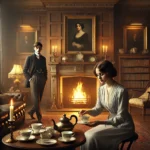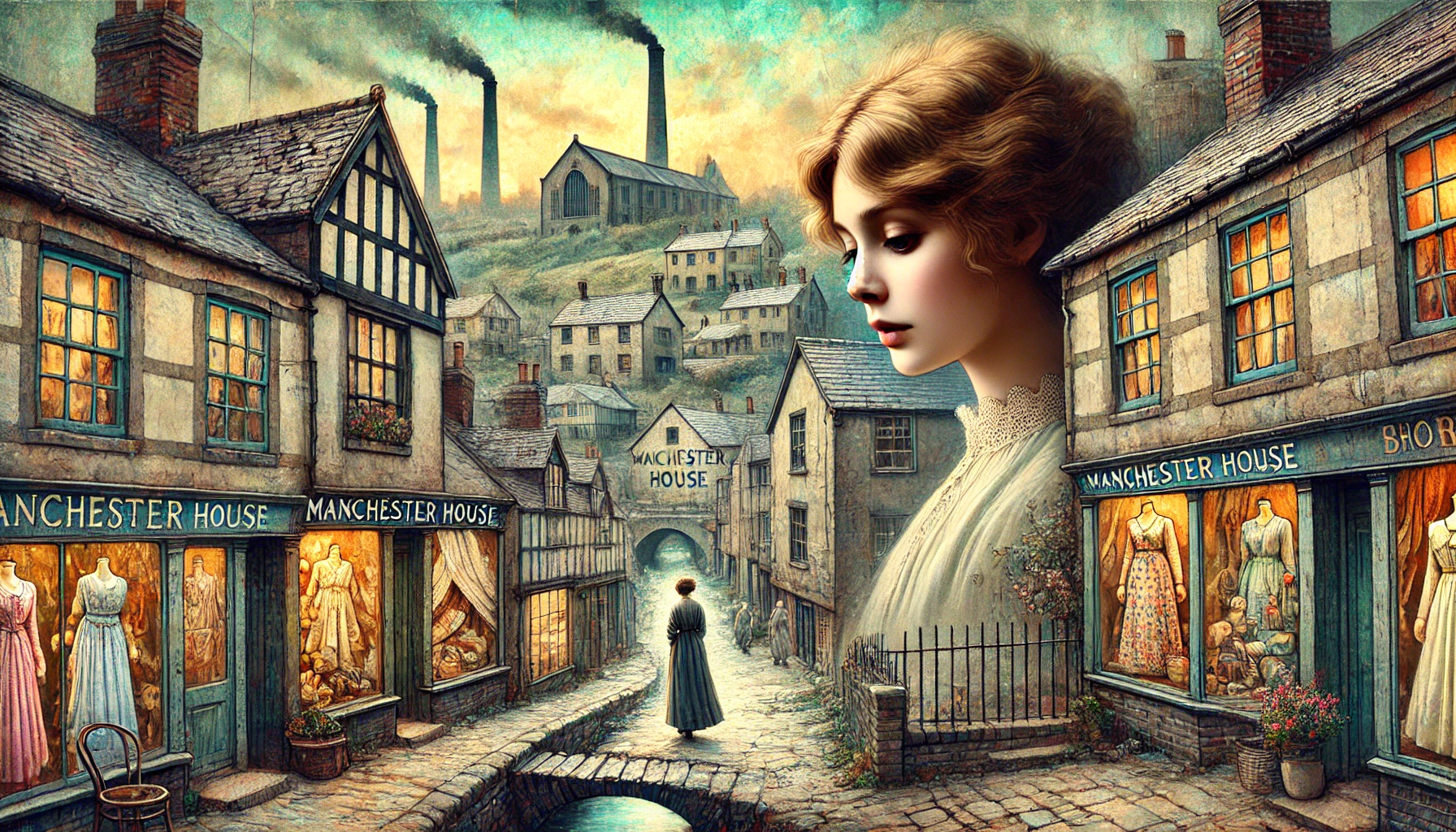Mrs. Dalloway, published in 1925, is one of Virginia Woolf’s most acclaimed works, epitomizing the modernist movement with its stream-of-consciousness narrative and introspective tone. Set over a single day in London, the story follows Clarissa Dalloway, a high-society woman preparing to host a party. Woolf intricately explores the intersections of personal and collective consciousness, memories, and societal expectations, providing profound insights into the human psyche in the post-World War I era.
Plot Summary
On a bright June morning in London, Clarissa Dalloway steps into the vibrant city air, the chimes of Big Ben marking the beginning of her day. She has a grand party planned for the evening and decides to purchase the flowers herself, savoring the freshness of the day. As she walks through the bustling streets, memories of her youth at Bourton come unbidden. She recalls Peter Walsh, her once passionate suitor, whose romantic intensity she chose to leave behind. Now, years later, Peter has returned from India, his life tangled with dreams unfulfilled and emotions unresolved. This is a day of subtle reckonings, where the past and present intermingle with almost palpable urgency.
In the same city, another soul moves through London, bearing memories not of youth and love but of the terrors of war. Septimus Warren Smith, a veteran of the Great War, walks with his wife, Lucrezia, through Regent’s Park, haunted by the shadow of his lost friend, Evans, who perished on the battlefield. Septimus sees the world around him vividly and painfully, unable to reconcile his visions with the indifference of the city’s flow. Despair fills his thoughts, and his inability to connect with others deepens his isolation. His wife, Rezia, watches him with helpless love and worry, her own suffering hidden as she attempts to draw him back to reality. She clings to fleeting hopes, persuaded by Dr. Holmes and Sir William Bradshaw, who each assure her that his condition is not serious, even as they coldly misinterpret Septimus’s anguish.
Clarissa’s thoughts linger on the choices she made years ago when she turned away from Peter to marry the kind, dependable Richard Dalloway, whose ambition suits the stability she desired then. Richard, though not one for declarations of love, is kind, embodying the safety that Clarissa once craved. Yet today, as Clarissa roams London, she senses an emptiness in the life she has created, a longing for something she cannot define. The sights, sounds, and people of the city bring the past rushing back. She reflects on Sally Seton, the vivacious and rebellious friend from her youth, whose presence had once electrified her days with visions of a different life. Sally had been daring, unconventional, and passionate—a person who made her see the world with new eyes.
As the hours pass, Peter appears unannounced, knocking on Clarissa’s door, rekindling the embers of their old connection. His arrival surprises her, stirring emotions long buried, and for a moment, their conversation slips into the candor they once shared in their youth. Peter speaks of his plans and failures, and Clarissa senses his lingering regret. The old familiarity unsettles her; it reminds her of paths not taken, of the intensity she left behind. Their conversation is bittersweet, shadowed by the tension between memory and present reality. Just as they once disagreed about the nature of life, they now face different paths, shaped by decisions that cannot be undone.
Meanwhile, in another corner of London, Septimus sits with Rezia in Regent’s Park, where his fractured mind seizes upon the beauty around him, believing he is receiving messages from another realm. Rezia watches him, her heart aching as his thoughts grow more disjointed, his voice reaching only the phantoms that populate his mind. She is frightened, helpless as his grip on reality slips further away. Septimus feels the weight of his memories pressing upon him, while Rezia feels equally isolated by his pain. Each doctor they see, every attempt to ease his suffering, only deepens his despair, leaving him feeling trapped and invisible within a society that does not understand him.
Back in her home, Clarissa feels a strange, mounting excitement as the evening approaches. She inspects her dress, instructs the servants, and mentally prepares herself for the guests. Her parties are her creation, moments when she can step into a role of importance and belonging, binding people together for a single night. As she contemplates the coming event, a sense of transcendence overcomes her—an awareness that her life, however small and ordinary, carries a beauty all its own. She sees herself within the fabric of the city and its people, woven into the vitality and the fleetingness of life.
As night falls and Clarissa’s guests arrive, her home fills with light and laughter. Richard returns, observing her in her role as the perfect hostess, quietly admiring the woman he married. Her guests are a blend of old and new, including Lady Bruton, Hugh Whitbread, and even Peter, whose unexpected appearance reminds her once again of her past. Sally Seton arrives, and with her, a touch of Clarissa’s youth fills the air. The years fall away, and for a moment, she remembers the thrill and intimacy of her friendship with Sally. But tonight, Sally is just another guest, a reminder of what once was but is no longer.
Elsewhere in London, Septimus’s night reaches a tragic end. Overcome by his torment, and knowing that Dr. Holmes is coming again to examine him, Septimus decides he can no longer endure the treatment that denies his suffering. In a desperate act to reclaim control over his fate, he leaps from a window, ending his life. His death sends a ripple through those who knew of him, a silent echo of the profound pain that could not be healed.
At her party, Clarissa hears of Septimus’s death, and an unexpected kinship forms within her. Though they never met, Clarissa senses that his act of defiance speaks to the part of herself that has always sought meaning in life’s brief moments. His death stirs her, evoking a contemplation of her own mortality, of the fragility that binds each human life. In his final choice, she sees a reflection of her own yearning to fully exist, even in the face of life’s inevitable end.
As the night draws to a close, Clarissa steps away from her guests and reflects on all she has lived, the beauty and the sorrow interwoven in every moment. In the solitude of the closing hours, she feels a strange, quiet triumph. She returns to her party, aware that while life may be fleeting, it is in each moment—each connection, each memory—that her existence finds its meaning.
Main Characters
Clarissa Dalloway: The titular character, a middle-aged woman of high social standing, Clarissa is reflective, complex, and haunted by unfulfilled desires and memories of her youth. She confronts existential questions about identity, aging, and societal roles while preparing for a party that symbolizes her dedication to social life.
Septimus Warren Smith: A shell-shocked war veteran suffering from severe PTSD, Septimus’s tragic mental decline contrasts sharply with Clarissa’s privileged world. Through Septimus, Woolf critiques the effects of war and society’s failure to understand mental illness.
Peter Walsh: An old suitor of Clarissa, Peter embodies the choices not taken in her life. Sentimental, idealistic, and somewhat disillusioned, Peter struggles with his feelings for Clarissa and reflects on his own life choices and unfulfilled ambitions.
Sally Seton: A symbol of freedom and nonconformity from Clarissa’s past, Sally is remembered with deep affection. Her wild spirit and charisma represent a world beyond Clarissa’s structured society and evoke a sense of lost possibility.
Richard Dalloway: Clarissa’s husband, Richard is a conventional politician who provides stability but is emotionally reserved. His character highlights Clarissa’s feelings of isolation within her marriage and the societal roles she feels confined by.
Lucrezia “Rezia” Warren Smith: Septimus’s devoted wife, Rezia is an Italian immigrant struggling to understand and care for her husband as he descends into madness. Her isolation and sorrow illustrate the painful impact of Septimus’s mental illness on those around him.
Theme
The Passage of Time and Mortality: Woolf uses Big Ben’s chimes to mark the hours, a reminder of time’s unstoppable march and the characters’ awareness of their mortality. Clarissa, especially, confronts aging, reflecting on the choices and relationships of her past.
Mental Illness and Trauma: Through Septimus, Woolf delves into post-war trauma, capturing the effects of PTSD and society’s inadequate understanding. His suffering contrasts with the superficiality of Clarissa’s social world, highlighting society’s neglect of those mentally scarred by the war.
Identity and Conformity: Clarissa often questions her role as a wife and hostess, which feels both comfortable and limiting. Her interactions with characters like Peter and Sally rekindle memories of her younger, more authentic self, sparking reflections on personal and societal identity.
The Search for Meaning: Characters grapple with the meaning of life and the nature of happiness, using parties, work, or love as ways to make sense of their existence. For Clarissa, her party represents an attempt to bring people together, seeking purpose in connection and celebration.
War and Its Consequences: Set in post-World War I London, the novel explores the lingering impact of war on society. Septimus personifies the trauma endured by soldiers, and his experiences expose society’s indifference to those who suffer.
Writing Style and Tone
Woolf’s writing style in Mrs. Dalloway is celebrated for its pioneering use of stream-of-consciousness, allowing readers to delve deeply into her characters’ thoughts and emotions. Her style mimics the fluid, often fragmented nature of human thought, blending memories and perceptions into the immediate present. This technique offers insight into Clarissa’s and Septimus’s inner lives, moving seamlessly between their reflections and the events unfolding around them. Through her detailed imagery and symbolic language, Woolf conveys each character’s nuanced experience, enriching the narrative with layers of psychological depth.
The tone of the novel is reflective and introspective, balancing melancholy with fleeting moments of joy and beauty. Woolf’s language is poetic, heightening the novel’s sense of intimacy and emotion. Despite the mundane setting—a day in the life of a London socialite—Woolf elevates it to explore profound themes, evoking empathy for each character’s private struggles and small victories. This reflective tone, combined with the poetic prose, offers readers a vivid portrayal of both the beauty and tragedy inherent in everyday life.
We hope this summary has sparked your interest and would appreciate you following Celsius 233 on social media:
There’s a treasure trove of other fascinating book summaries waiting for you. Check out our collection of stories that inspire, thrill, and provoke thought, just like this one by checking out the Book Shelf or the Library
Remember, while our summaries capture the essence, they can never replace the full experience of reading the book. If this summary intrigued you, consider diving into the complete story – buy the book and immerse yourself in the author’s original work.
If you want to request a book summary, click here.
When Saurabh is not working/watching football/reading books/traveling, you can reach him via Twitter/X, LinkedIn, or Threads
Restart reading!








